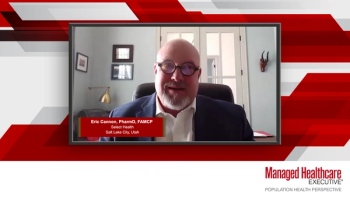Eric Cannon, PharmD, FAMCP
Articles by Eric Cannon, PharmD, FAMCP

Eric Cannon, PharmD, FAMCP, discusses how precision medicine advancements and biomarker development can enable targeted idiopathic pulmonary fibrosis (IPF) and progressive pulmonary fibrosis (PPF) therapies by identifying patient subgroups most likely to benefit from specific interventions. Artificial intelligence (AI) integration offers potential for earlier diagnosis, improved prognostication and personalized treatment optimization through data pattern recognition.

Eric Cannon, PharmD, FAMCP, discusses how LPA1 receptor activation promotes fibrosis in idiopathic pulmonary fibrosis (IPF) and progressive pulmonary fibrosis (PPF) through myofibroblast differentiation and ECM production. Admilparant shows promising antifibrotic activity in preclinical models but requires phase 3 efficacy data. As a novel targeted therapy, it may complement existing antifibrotics, particularly for progressive phenotypes with high LPA1 expression.

Eric Cannon, PharmD, FAMCP, discusses how the PDE4B pathway promotes inflammation and fibrosis in idiopathic pulmonary fibrosis (IPF) and progressive pulmonary fibrosis (PPF) by regulating cAMP levels and fibroblast activity. Nerandomilast has shown promising anti-inflammatory and antifibrotic effects in preclinical models, with early clinical trials suggesting good tolerability and potential lung function stabilization. However, larger phase 3 trials with longer follow-up are needed to confirm efficacy, safety and impact on disease progression.

